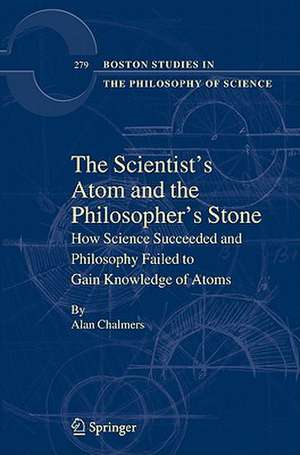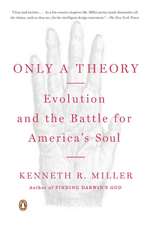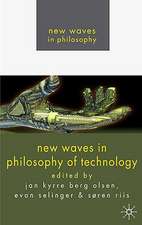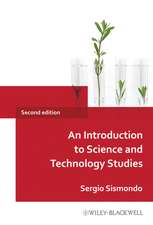The Scientist's Atom and the Philosopher's Stone: How Science Succeeded and Philosophy Failed to Gain Knowledge of Atoms: Boston Studies in the Philosophy and History of Science, cartea 279
Autor Alan Chalmersen Limba Engleză Paperback – 15 dec 2010
| Toate formatele și edițiile | Preț | Express |
|---|---|---|
| Paperback (1) | 640.55 lei 43-57 zile | |
| SPRINGER NETHERLANDS – 15 dec 2010 | 640.55 lei 43-57 zile | |
| Hardback (1) | 646.62 lei 43-57 zile | |
| SPRINGER NETHERLANDS – 17 iun 2009 | 646.62 lei 43-57 zile |
Din seria Boston Studies in the Philosophy and History of Science
- 18%
 Preț: 944.19 lei
Preț: 944.19 lei - 15%
 Preț: 646.75 lei
Preț: 646.75 lei - 15%
 Preț: 646.75 lei
Preț: 646.75 lei - 15%
 Preț: 699.28 lei
Preț: 699.28 lei - 18%
 Preț: 736.50 lei
Preț: 736.50 lei -
 Preț: 500.02 lei
Preț: 500.02 lei - 15%
 Preț: 643.16 lei
Preț: 643.16 lei - 15%
 Preț: 650.69 lei
Preț: 650.69 lei - 15%
 Preț: 634.18 lei
Preț: 634.18 lei - 15%
 Preț: 642.68 lei
Preț: 642.68 lei -
 Preț: 391.40 lei
Preț: 391.40 lei -
 Preț: 383.33 lei
Preț: 383.33 lei - 18%
 Preț: 944.19 lei
Preț: 944.19 lei - 18%
 Preț: 955.56 lei
Preț: 955.56 lei - 15%
 Preț: 643.65 lei
Preț: 643.65 lei -
 Preț: 392.75 lei
Preț: 392.75 lei - 18%
 Preț: 1229.10 lei
Preț: 1229.10 lei - 18%
 Preț: 1238.23 lei
Preț: 1238.23 lei - 18%
 Preț: 951.29 lei
Preț: 951.29 lei - 18%
 Preț: 1223.25 lei
Preț: 1223.25 lei - 18%
 Preț: 1225.79 lei
Preț: 1225.79 lei - 18%
 Preț: 1226.42 lei
Preț: 1226.42 lei - 18%
 Preț: 1236.82 lei
Preț: 1236.82 lei - 15%
 Preț: 644.49 lei
Preț: 644.49 lei - 18%
 Preț: 1231.78 lei
Preț: 1231.78 lei - 15%
 Preț: 644.30 lei
Preț: 644.30 lei - 18%
 Preț: 957.62 lei
Preț: 957.62 lei - 18%
 Preț: 1222.49 lei
Preț: 1222.49 lei - 18%
 Preț: 947.50 lei
Preț: 947.50 lei - 18%
 Preț: 1833.95 lei
Preț: 1833.95 lei - 18%
 Preț: 1227.99 lei
Preț: 1227.99 lei - 18%
 Preț: 947.35 lei
Preț: 947.35 lei
Preț: 640.55 lei
Preț vechi: 753.60 lei
-15% Nou
Puncte Express: 961
Preț estimativ în valută:
122.61€ • 133.22$ • 103.06£
122.61€ • 133.22$ • 103.06£
Carte tipărită la comandă
Livrare economică 21 aprilie-05 mai
Preluare comenzi: 021 569.72.76
Specificații
ISBN-13: 9789400705333
ISBN-10: 9400705336
Pagini: 287
Ilustrații: XII, 287 p.
Dimensiuni: 155 x 235 x 16 mm
Greutate: 0.42 kg
Ediția:2009
Editura: SPRINGER NETHERLANDS
Colecția Springer
Seria Boston Studies in the Philosophy and History of Science
Locul publicării:Dordrecht, Netherlands
ISBN-10: 9400705336
Pagini: 287
Ilustrații: XII, 287 p.
Dimensiuni: 155 x 235 x 16 mm
Greutate: 0.42 kg
Ediția:2009
Editura: SPRINGER NETHERLANDS
Colecția Springer
Seria Boston Studies in the Philosophy and History of Science
Locul publicării:Dordrecht, Netherlands
Public țintă
ResearchCuprins
Atomism: Science or Philosophy?.- Democritean Atomism.- How does Epicurus’s Garden Grow?.- Atomism in its Ancient Greek Perspective.- From the Ancient Greeks to the Dawn of Science.- Atomism, Experiment and the Mechanical Philosophy: The Work of Robert Boyle.- Newton’s Atomism and its Fate.- The Emergence of Modern Chemistry With No Debt to Atomism.- Dalton’s Atomism and its Creative Modification via Chemical Formulae.- From Avogadro to Cannizzaro: The Old Story.- Thermodynamics and the Kinetic Theory.- Experimental Contact with Molecules.- Experimental Contact with Electrons.- Atomism Vindicated?.
Recenzii
From the reviews:
“Chalmers presents a comprehensive history of the atom, from antiquity to the early twentieth century. … Chalmers’s account draws on his distinction between philosophical and scientific versions of atomism. … His writing and exposition are clear, and the account is well documented and balanced and draws judiciously on primary and secondary sources. It should be of interest to historians and philosophers of science and to scientists more generally.” (Victor D. Boantza, ISIS, Vol. 103 (1), 2012)
“This book offers a conceptual history of atomism from the pre-Socratics to the end of the nineteenth century. … the first covers ancient Greek and medieval atomic and matter theories; the second deals with the scientific and chemical revolutions; and the third takes the story from Dalton through to the experimental discovery of the electron … . Chalmers makes his arguments clearly, powerfully and well. … inspire debates not only in those fields, but also in related fields within science studies.” (Seth Suman, British Journal for the History of Science, Vol. 44 (3), September, 2011)
“Alan Chalmers has strong views about what does and does not deserve to be considered ‘science’. In this book he examines a number of historical developments that are frequently cited in accounts of the origin of the outlook … . those generally used in introductory chemistry courses––and to take issue with specialized historians and philosophers. … historical stories widely used as background for introductory chemistry courses merits the serious attention of professional philosophers and historians, and also of science educators.” (Joseph E. Earley, Foundations of Chemistry, Vol. 13, 2011)
“Alan Chalmers has written by far the most important and incisive book of recent years on the fundamental and difficult notions of atoms and atomism. … In each chapter of his book Chalmers outlines modern lines of scholarship concerning the history of chemistry and physics … . Chalmers’ book is a masterpiece in the history and philosophy of science and on a neglected topic of great importance. It should be read by everyone with an interest in the field.” (Eric Scerri, Metascience, Vol. 19, August, 2010)
“The current book arose from Chalmers teaching of an advanced level HPS course … in the early 1990s. … a detailed scholarly work for graduate students, historians and philosophers. … Chalmers’ extensive research (about 250 references cited) his clarity of expression and well structured argument mean that both immodest realists and constructivists can benefit from a close and thoughtful reading of Atomism.” (Michael R. Matthews, Science & Education, March, 2010)
"It’s reasonable to see philosophy and science as natural partners, complementary in their application and intimately related. … Alan Chalmers textbook is an example of the healthy relationship that can, and often does, exist. It is therefore a welcome addition to the philosophyof science and should benefit students of philosophy and science … . it will help put the relationship between science and philosophy into the right perspective. … This serves to provide a comprehensive history of the relationship between philosophy and science." (Ken Perrott, Open Parachute, August, 2009)
“Chalmers presents a comprehensive history of the atom, from antiquity to the early twentieth century. … Chalmers’s account draws on his distinction between philosophical and scientific versions of atomism. … His writing and exposition are clear, and the account is well documented and balanced and draws judiciously on primary and secondary sources. It should be of interest to historians and philosophers of science and to scientists more generally.” (Victor D. Boantza, ISIS, Vol. 103 (1), 2012)
“This book offers a conceptual history of atomism from the pre-Socratics to the end of the nineteenth century. … the first covers ancient Greek and medieval atomic and matter theories; the second deals with the scientific and chemical revolutions; and the third takes the story from Dalton through to the experimental discovery of the electron … . Chalmers makes his arguments clearly, powerfully and well. … inspire debates not only in those fields, but also in related fields within science studies.” (Seth Suman, British Journal for the History of Science, Vol. 44 (3), September, 2011)
“Alan Chalmers has strong views about what does and does not deserve to be considered ‘science’. In this book he examines a number of historical developments that are frequently cited in accounts of the origin of the outlook … . those generally used in introductory chemistry courses––and to take issue with specialized historians and philosophers. … historical stories widely used as background for introductory chemistry courses merits the serious attention of professional philosophers and historians, and also of science educators.” (Joseph E. Earley, Foundations of Chemistry, Vol. 13, 2011)
“Alan Chalmers has written by far the most important and incisive book of recent years on the fundamental and difficult notions of atoms and atomism. … In each chapter of his book Chalmers outlines modern lines of scholarship concerning the history of chemistry and physics … . Chalmers’ book is a masterpiece in the history and philosophy of science and on a neglected topic of great importance. It should be read by everyone with an interest in the field.” (Eric Scerri, Metascience, Vol. 19, August, 2010)
“The current book arose from Chalmers teaching of an advanced level HPS course … in the early 1990s. … a detailed scholarly work for graduate students, historians and philosophers. … Chalmers’ extensive research (about 250 references cited) his clarity of expression and well structured argument mean that both immodest realists and constructivists can benefit from a close and thoughtful reading of Atomism.” (Michael R. Matthews, Science & Education, March, 2010)
"It’s reasonable to see philosophy and science as natural partners, complementary in their application and intimately related. … Alan Chalmers textbook is an example of the healthy relationship that can, and often does, exist. It is therefore a welcome addition to the philosophyof science and should benefit students of philosophy and science … . it will help put the relationship between science and philosophy into the right perspective. … This serves to provide a comprehensive history of the relationship between philosophy and science." (Ken Perrott, Open Parachute, August, 2009)
Textul de pe ultima copertă
Drawing on the results of his own scholarly research as well as that of others the author offers, for the first time, a comprehensive and documented history of theories of the atom from Democritus to the twentieth century. This is not history for its own sake. By critically reflecting on the various versions of atomic theories of the past the author is able to grapple with the question of what sets scientific knowledge apart from other kinds of knowledge, philosophical knowledge in particular. He thereby engages historically with issues concerning the nature and status of scientific knowledge that were dealt with in a more abstract way in his What Is This Thing Called Science?, a book that has been a standard text in philosophy of science for three decades and which is available in nineteen languages. Speculations about the fundamental structure of matter from Democritus to the seventeenth-century mechanical philosophers and beyond are construed as categorically distinct from atomictheories amenable to experimental investigation and support and as contributing little to the latter from a historical point of view. The thesis will provoke historians and philosophers of science alike and will require a revision of a range of standard views in the history of science and philosophy. The book is key reading for students and scholars in History and Philosophy of Science and will be instructive for and provide a challenge to philosophers, historians and scientists more generally.
Caracteristici
The only book that covers the history of atomism in a scholarly way from Democritus to the twentieth century Gives substance to debates about the character of scientific knowledge through a sustained historical example Distinguishes between scientific and philosophical matter theories in an original way that will challenge historians and philosophers alike Distinguishes between mechanical and experimental philosophy in the seventeenth century that will require much traditional history of the science and philosophy of that period to be rewritten Provides an historically informed account of the distinctive features of science written in a clear and engaging way that makes it accessible to a wide audience













